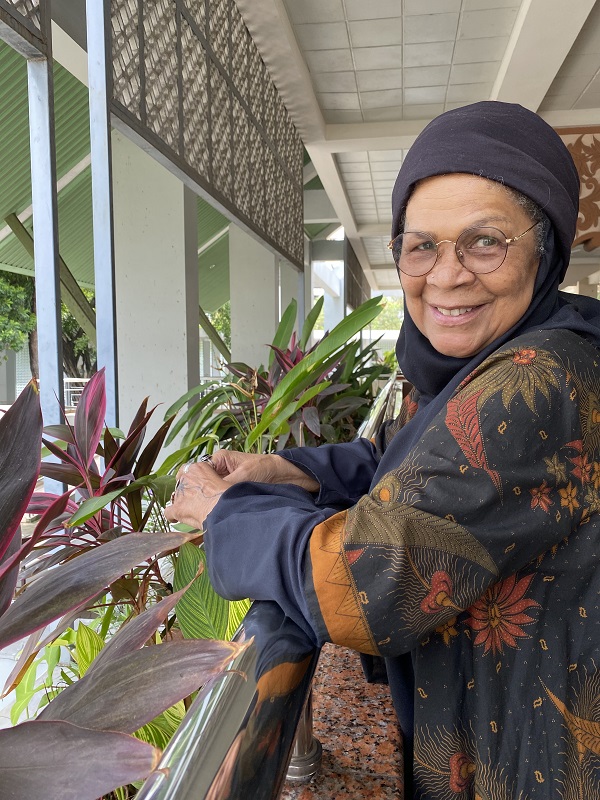In my current casual reading, a novel, the answer to the question “and where is God for you?” was expressed this way:
“Definitely in the car with us as we talk and exchange things, and change each other in the process…People have things they want to give away, or they want things they don’t know where to look for, and they need containers to pool their information. This night is far too large for us to rattle around in on our own. It’s a perfect fit for God, but we need our container. We need one another for God to work through us: that’s something I experience every day. The concept of God is way too big for me to get my mind around, but despite that, maybe even because of it, the relationship keeps growing and changing. Sometimes it grows so slowly it seems it’s stopped. Or gone in reverse. Then when I least expect it, it takes a big leap forward.”
I was struck by this first because of the concept of God being “way too big.” I struggle with this and yet would have it no other way. I have gone out my way to kill off the childhood concepts of God, referred to in that book Your God is Too Small. It explains that for many people, their concept of God has not advanced far from the one they had as a child – from the Big Bad Punisher to the tooth fairy God of requisition. As a strict monotheist, I constantly fight to smash the idols of my own imagination or preoccupation. To get God out of any box.
But as Ibn al-Arabi, the 13th century Andalusian mystic and philosopher, said, sometimes this abstract God is not easy for a person to love. So I sometimes feel envy for people whose faith is intimately wrapped into a very personal God: A God whom they expect to respond to their slightest whims and wants! Overall, I find such a personal God a tad bit too contained. For one thing, I’m not sure all my whims and wants are necessarily good for me or for my higher goal of synchronizing my mind, body and soul to the whole of the universe, in both what is created and uncreated.
I guess you could say: I grapple with God.
Still, more than any other topic, I love to talk about God. (Yet only once in my life have I ever been accused of trying to proselytize.) As a religious studies professor (emeritus) I worked hard to create a space for conversations about the phenomena of the sacred, without offense or defense. That meant space for even diametrically opposed ideas about God and a multiplicity of intimacies to genuinely share and to avoid erecting walls.
I’m also clear that I cannot talk about this subject with everyone. For some people only silence is an acceptable level of God-talk; they oppose any kind of reference, no matter how obscure. For some it is only as God the Father in relationship to God the Son that they can speak—or hear. To accommodate variations from Nothing to Everything, I probably talk less about what interests me most and more just to pass the time and be polite in conversation.
Then on certain occasions, or with certain persons with whom I share the greatest intimacy, the theme of God returns to its all time high point of my discourse. When I read this passage I understood a little bit more how this love of God as a subject of discourse would impact on the very nature of my relationships. People who know me best know how central is my personal, professional and political relationship with the Ultimate—it IS my reason for living, the motivation behind my life’s work. What a paradox to want to talk about God, while mostly recognizing that few people really want to hear about that subject.
So I do not consider myself a person with many friends. I know a lot of people, and many more people seem to know me. But I am drawn closely only to those with whom I can discuss my favorite subject. This is even true with my children. I once complained that they don’t know about my work, to which I was told, I love you for who you are not for what you do. Sounds great, right? Actually it left me feeling more alone because what I do is who I am and it is likewise connected to my deep motivation to conceptualize God as a Living Force in the life of human justice and dignity. Can anyone love me, who does not know me and this burning attachment to continued and ever changing dialectics with God?
This passage further impressed me, because this conversation conceives of that dialectic as a construct between a very big God and those persons in whatever circumstance they are able to have such a conversation. By the very act of engaging in the discourse somehow both God and the circumstances of life are manageable. “People have things they want to give away, or they want things they don’t know where to look for.”
“…and they need containers to pool their information.” I guess this is the crux of it. With whom can we make such an exchange except in the very boxes of our lives that change and grow with each second let alone each encounter with awesome mysteries and terrible sublimity? But notice: the boxes are our interactions NOT our God. God “fits” perfectly in each such encounter.
Without ones to share this kind of encounter (like Alice Walker said in the Color Purple: “people don’t come to church to find God, they come to church to share God.”), then the very encounter with the Sacred can itself be empty. “We need one another for God to work through us…”
amina wadud is Professor Emerita of Islamic Studies, now traveling the world over seeking answers to the questions that move many of us through our lives. Author of Qur’an and Woman: Rereading the Sacred Text from a Woman’s Perspective and Inside the Gender Jihad, she will blog on her life journey and anything that moves her about Islam, gender and justice, especially as these intersect with the rest of the universe.


I had to read this entry twice to get it. The first time I had to sit with the challenge of a relationship with God not being about having my every want and whim heard– a concept I didn’t expect to be challenging to me. But nonetheless I steeped in the idea that Allah perfectly fits in the containers we create between us– “between us” is key! Very different than between us and our own minds. The second time I read it, having dealt with the challenges to my notions of God, I was less defensive and really heard the part about connecting with others to share Allah… and I fondly recalled such conversations. I too LOVE to have such conversations and find that others are inclined when they don’t sense the threat of right and wrong but instead giving and sharing.